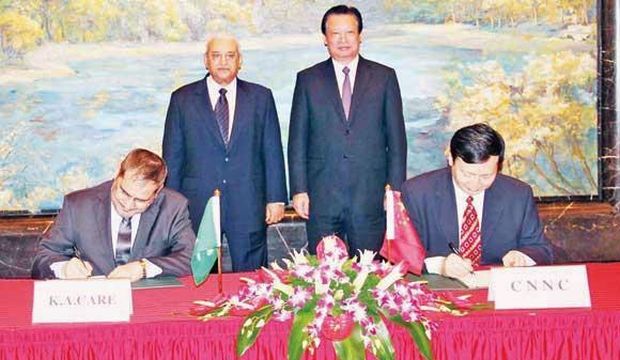
Waleed Hussein Abu Al-Faraj, vice president of the King Abdullah City for Atomic and Renewable Energy (L), and Hwan Min Gang, chief financial officer of the Chinese National Nuclear Corporation (R), sign an MoU to boost nuclear and renewable energy cooperation between Saudi Arabia and China in the Chinese capital Beijing, on Saturday, August 9, 2014. (SPA)
Riyadh, Asharq Al-Awsat—Saudi Arabia and China have signed an agreement to boost cooperation in the production and peaceful use of nuclear and renewable energy, as the Kingdom seeks to reduce its dependence on hydrocarbons and bolster its ties with the world’s second-biggest economy.
The memorandum of understanding (MoU) was signed on Saturday in the Chinese capital Beijing between the King Abdullah City for Atomic and Renewable Energy (K.A.CARE) and the Chinese National Nuclear Corporation (CNNC), the country’s state-owned nuclear energy company.
K.A.CARE, established by Custodian of the Two Holy Mosques King Abdullah Bin Abdulaziz in 2010, is the Kingdom’s renewable energy research hub, mandated to seek alternatives to non-renewable sources of energy such as hydrocarbons.
Speaking to Asharq Al-Awsat via the telephone from Beijing, Chinese ambassador to Saudi Arabia Li Chengwen said: “The numerous recent MoUs [signed] between the two countries are the result of the visit by Saudi Crown Prince Salman Bin Abdulaziz to our country at the beginning of this year.”
Prince Salman visited China as part of a tour of Asia in January, seeking to further strengthen ties between the two countries.
Li added that the visit had resulted in several companies being set up in China specifically to invest in the Kingdom.
He also pointed out that a number of “mega projects” between the two countries were currently on the cards in a number of areas including infrastructure, aerospace, and satellites.
Li said Beijing regarded Riyadh as its launching pad for the region in terms of nuclear and renewable energy, and expected a number of “massive” projects and investments in this sector between the two countries to be launched soon, ones that would also have benefits for other countries in the region.
He also said that the leadership of the two countries would be looking to widen their ties in other fields as well, pointing out that in recent years there had been a rapid development in cooperation in a number of areas including manufacturing, trade and investment.
Saudi Arabia is China’s biggest supplier of crude oil, covering 19 percent of all Chinese oil imports by 2013, and has been its biggest trading partner in Western Asia and Africa for 12 years running.
China became Saudi Arabia’s largest trading partner in 2013. Saudi–Chinese bilateral trade rose 14 percent the year before to reach 73 billion US dollars, comfortably exceeding the trade volume target of 60 billion dollars set by both countries for 2015.
